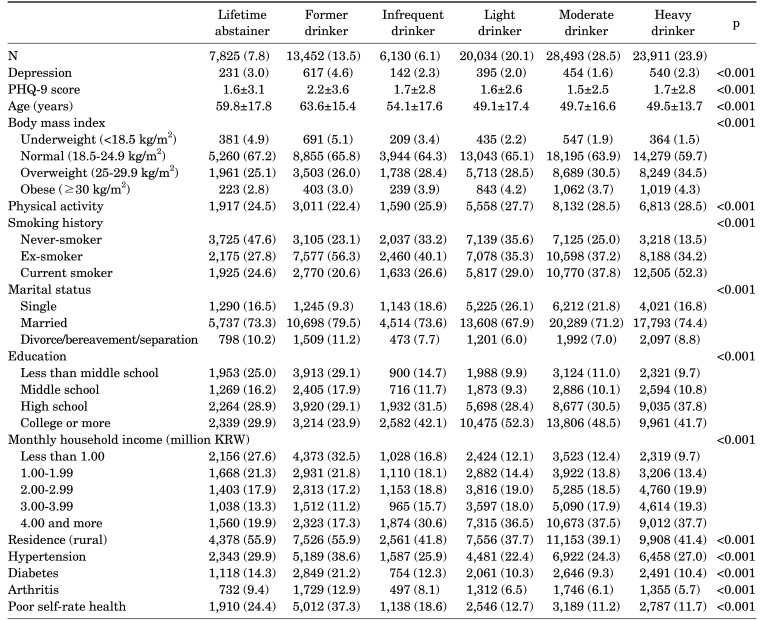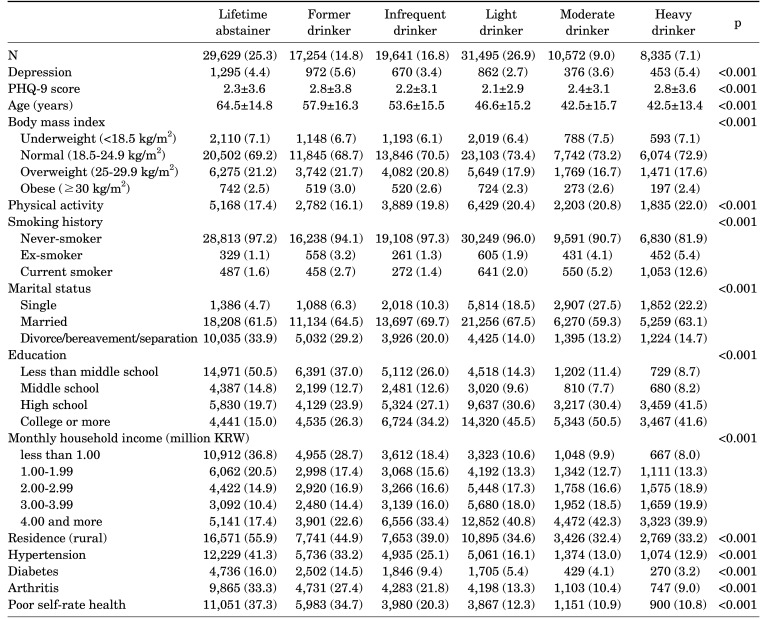Association between Alcohol Drinking Status and Depressive Symptoms in Korean Adults.
引用次数: 3
Abstract
We investigated the association between alcohol drinking status and depressive symptoms in a representative sample of South Korean adults using data from the 2017 Korea Community Health Survey (KCHS), which included 216,771 participants (99,845 men and 116,926 women). Depression was defined as a Patient Health Questionnaire-9 score of ≥10. Multivariate logistic regression using sampling weights was used to assess the relationship between alcohol drinking status and depression after adjusting for potential confounders. Alcohol intake was nonlinearly associated with depression; the risk of depression was the lowest in men who were moderate drinkers and women who were light drinkers. In men, heavy drinkers (odds ratio [OR] 1.41, 95% confidence interval [CI] 1.19–1.67), light drinkers (OR 1.13, 95% CI 0.94–1.36), infrequent drinkers (OR 1.31, 95% CI 1.00–1.73), and lifetime abstainers (OR 1.38, 95% CI 1.09–1.75) were at a higher risk of depression than moderate drinkers. In women, moderate drinkers (OR 1.19, 95% CI 1.02–1.40) and heavy drinkers (OR 1.56, 95% CI 1.33–1.84) were at a higher risk of depression than light drinkers; however, infrequent drinkers and lifetime abstainers were not at a high risk of depression. In both men and women, former drinkers were at a higher risk of depression (OR 1.61, 95% CI 1.34–1.93 and OR 1.25, 95% CI 1.09–1.43, respectively). In conclusion, the association between alcohol drinking status and depression was nonlinear in both sexes. Further investigation of age- and sex-specific factors related to the association between alcohol use and depression is needed.



韩国成年人饮酒状况与抑郁症状的关系
我们使用2017年韩国社区健康调查(KCHS)的数据,在韩国成年人的代表性样本中调查了饮酒状况与抑郁症状之间的关系,该调查包括216,771名参与者(99,845名男性和116,926名女性)。抑郁症定义为患者健康问卷-9得分≥10。在调整了潜在的混杂因素后,使用抽样权重的多变量逻辑回归来评估饮酒状况与抑郁症之间的关系。酒精摄入与抑郁呈非线性相关;男性适度饮酒者和女性轻度饮酒者患抑郁症的风险最低。在男性中,重度饮酒者(比值比[OR] 1.41, 95%可信区间[CI] 1.19-1.67)、轻度饮酒者(比值比[OR] 1.13, 95% CI 0.94-1.36)、不常饮酒者(比值比[OR] 1.31, 95% CI 1.00-1.73)和终生不饮酒者(比值比[OR] 1.38, 95% CI 1.09-1.75)患抑郁症的风险高于中度饮酒者。在女性中,适度饮酒者(OR 1.19, 95% CI 1.02-1.40)和重度饮酒者(OR 1.56, 95% CI 1.33-1.84)患抑郁症的风险高于轻度饮酒者;然而,不经常喝酒和终生不喝酒的人患抑郁症的风险并不高。在男性和女性中,前饮酒者患抑郁症的风险更高(OR分别为1.61,95% CI 1.34-1.93和OR 1.25, 95% CI 1.09-1.43)。总之,在两性中,饮酒状况与抑郁之间的关系是非线性的。需要进一步调查酒精使用与抑郁症之间关系的年龄和性别特异性因素。
本文章由计算机程序翻译,如有差异,请以英文原文为准。
求助全文
约1分钟内获得全文
求助全文

 求助内容:
求助内容: 应助结果提醒方式:
应助结果提醒方式:


